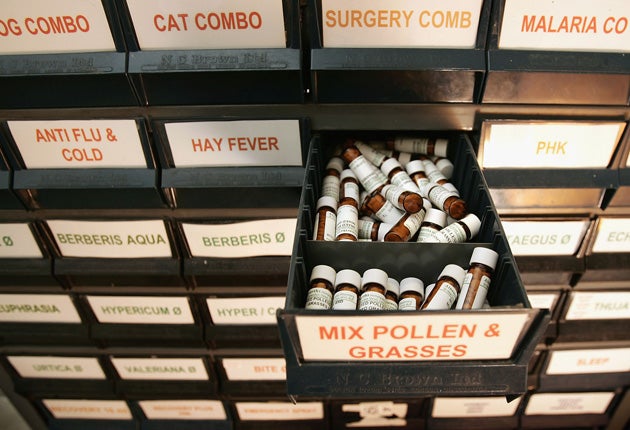'Homeopathy is no more effective than placebo for almost every illness,' says health council
Users who have serious illnesses could be putting themselves at risk

Your support helps us to tell the story
From reproductive rights to climate change to Big Tech, The Independent is on the ground when the story is developing. Whether it's investigating the financials of Elon Musk's pro-Trump PAC or producing our latest documentary, 'The A Word', which shines a light on the American women fighting for reproductive rights, we know how important it is to parse out the facts from the messaging.
At such a critical moment in US history, we need reporters on the ground. Your donation allows us to keep sending journalists to speak to both sides of the story.
The Independent is trusted by Americans across the entire political spectrum. And unlike many other quality news outlets, we choose not to lock Americans out of our reporting and analysis with paywalls. We believe quality journalism should be available to everyone, paid for by those who can afford it.
Your support makes all the difference.Homeopathic remedies are “no more effective than placebo” in treating health problems, new research shows.
The alternative medicine does not cure any conditions that are chronic, serious or could become serious – according to an assessment by the National Health and Medical Research Council in Australia.
Sufferers of some physical and mental illnesses, that are believed to be treatable with homeopathic remedies, are urged to seek medical advice. The council claim that people could jeopardise their health by not taking prescribed and approved drugs.
Homeopathy is based on the premise that the substances that cause illnesses can become remedies when highly-diluted in water or an alcohol-based tincture.
Practitioners believe that the molecules retain their memory of the original substance when diluted and rigorously shaken in a process known as ‘poteniation’ or ‘dynamisation’.
A total of 225 existing studies from as far back as 1997 were rated in the NHMRC assessment from one (very strong) to four (very weak) to determine the reliability of their conclusions.
The council found that there is no solid evidence that shows homeopathy being more effective than sugar pills, and other placebos, in making patients feel better and recover.
Chief executive Warwick Anderson says: “There were no health conditions for which there was reliable evidence that homeopathy was effective. For some health conditions, studies reported that homeopathy was not more effective than placebo.
“People who choose homeopathy may put their health at risk if they reject or delay treatments for which there is good evidence for safety and effectiveness,” it added.

Illnesses such as asthma, migraines, stress and colds were tested against homeopathic treatments. Due to lack of evidence, it was found to be not more effective than pretend medicine.
Even though homeopathy has shown some signs of being more effective than placebos for conditions such as ADHD, bruising, HIV, chronic fatigue, ulcers and depression, the experiments were not conducted properly and did not result in very reliable evidence – the report says.
A treatment is considered effective if it causes improvements that cannot be described by the placebo effect and are unlikely to be down to chance. The health improvement has to be significant and continuous for the medicine to be deemed successful – according to the NHMRC.
British and Swiss national health departments have also concluded in the past that homeopathy is not effective enough to be funded by the state. The Australian Homeopathic Association said it was in the process of preparing a formal response to the NHMRC report.
“The Australian Homeopathic Association recommend to the NHMRC that it take a more comprehensive approach to the analysis of homeopathy’s efficacy, and consider a large-scale economic evaluation of the benefits of a more integrated system and one which respects and advocates patient choice in healthcare provision,” the AHA said according to The Guardian.
Australians spend around A$9.59 million (£7.3 million) on homeopathy treatments, based on 2009 World Health Organisation statistics.
Join our commenting forum
Join thought-provoking conversations, follow other Independent readers and see their replies
Comments